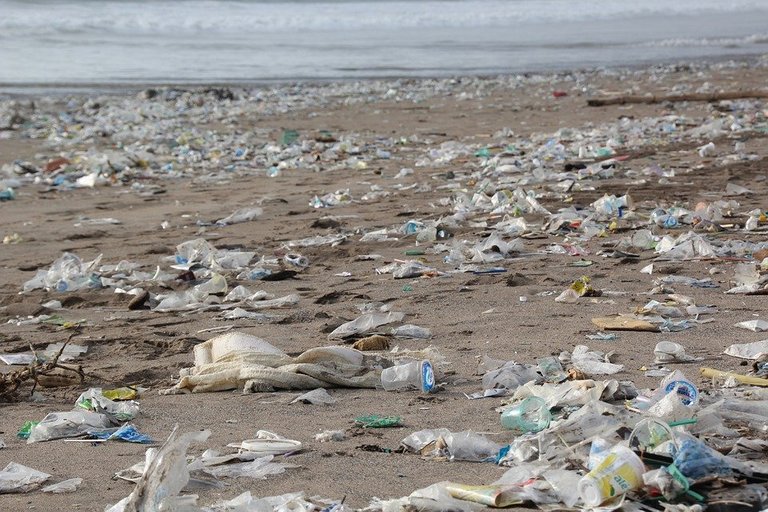Plastic is killing the oceans' wildlife
We all know that plastic has caused all kinds of pollution problems, mainly because it persists for a long time in the environment, causing huge accumulation problems. But in the ocean its impact is even greater, as it causes terrible damage to marine fauna, for example, the remains of fishing nets and fishing lines become a death trap for many species, as when one of their limbs becomes entangled, it limits their mobility or is amputated; or as the translucent microplastic is mistaken for food and blocks the digestive tract of some species, which then causes their death by starvation.

Plastic is a death trap for marine species. Source: pixabay.com
But the problem is not limited to the fauna of the oceans, as plastic ingested by animals can reach humans through the marine trophic chain. That is why every gram of plastic waste that is abandoned, every gram of material that is not properly recycled becomes a major threat to marine wildlife and to ourselves.
A study published by Global Change Biology[1] reports on the terrible problem that plastic represents for marine wildlife. The study describes that the highest ingestion of plastic by marine wildlife occurs in the Pacific ocean and the Mediterranean, and this varies according to the species and type of plastic; for example, 66% of the plastic ingested by sea turtles is white plastic, in cetaceans almost 80% is fibres, while fish seem to prefer fibres and transparent plastics.
And where does so much plastic come from?
On the one side we know that much of the plastic reaching the oceans is from land, it is difficult to estimate the exact amount, by linking global data, one study estimated that 275 million metric tons of plastic waste were produced in 192 coastal countries in 2010, and that between 4.8 and 12.7 million metric tons entered the ocean, estimating that it would double in order of magnitude by 2025[2].

Most of the plastic in the oceans is dragged from land. Source: pixabay.com.
Although clothing fibers and fishing line also represent a threat, the greatest impact is generated by the dragging of plastic waste through runoff into the sea. The large volume of plastic is then fragmented by the action of waves and other climatic factors into small pieces that form microplastics, which are then ingested and mistaken for food.
It is everyone's problem
Although it has been detected that the Pacific Ocean has the highest concentrations of plastic in the bodies in marine specimens, this is a global problem, since ocean circulation makes it very easy for garbage to travel to any part of the world.

Plastic can be transported by currents to any part of the world. Source: pixabay.com.
Faced with this reality we must be more aware of the problem, in a recent study it was estimated that the total mass of waste produced by man exceeded in 2020 the entire global living biomass[3]. It is therefore urgent to take action, the impact of plastic waste pollution in our oceans requires urgent strategies and address the problem with a global vision, otherwise, we can only expect that the preferred food of our marine fauna will be plastic, negatively affecting all of humanity.
Thanks for stopping by to read friends, I hope you keep this information in mind and be more careful with your plastic waste.
References
- Sergio López‐Martínez, Carmen Morales‐Caselles, Julianna Kadar, Marga L. Rivas. Overview of global status of plastic presence in marine vertebrates. Global Change Biology (2020)
- Jenna R. Jambeck, Roland Geyer, Chris Wilcox, Theodore R. Siegler, Miriam Perryman. Plastic waste inputs from land into the ocean. Science (2015)
- Emily Elhacham, Liad Ben-Uri, Jonathan Grozovski, Yinon M. Bar-On & Ron Milo. Global human-made mass exceeds all living biomass. Nature (2020)

One of the problems with plastic pollution is that plastic takes an extremely very long time to degrade. In my opinion, it is always good to use only recycle-able plastics and they should not be disposed in water and environment.
Nice piece buddy
Thanks friend, we really need to cultivate the culture of recycling, and above all, prevent plastic waste from reaching the water.
This post has been manually curated by @bala41288 from Indiaunited community. Join us on our Discord Server.
Do you know that you can earn a passive income by delegating to @indiaunited. We share 80 % of the curation rewards with the delegators.
Here are some handy links for delegations: 100HP, 250HP, 500HP, 1000HP.
Read our latest announcement post to get more information.
Please contribute to the community by upvoting this comment and posts made by @indiaunited.
Thanks!
Your post has been voted as a part of Encouragement program. Keep up the good work!
Try https://ecency.com and Earn Points in every action (being online, posting, commenting, reblog, vote and more).
Boost your earnings, double reward, double fun! 😉
Support Ecency, in our mission:
Ecency: https://ecency.com/proposals/141
Hivesigner: Vote for Proposal
Thank you very much!